AirCare 3 increases critical care access for north Mississippi
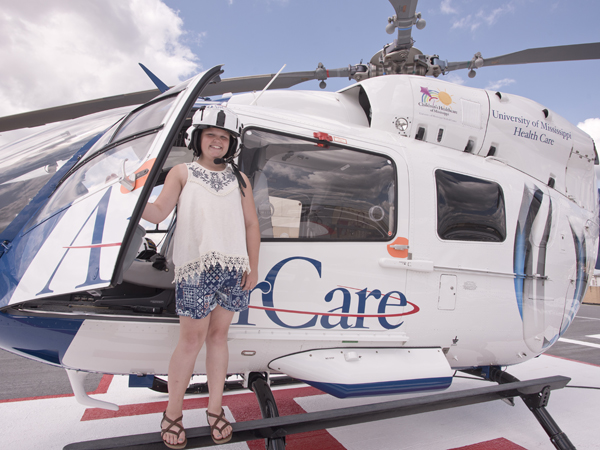
Published in News Stories on May 19, 2016
Abby Williams had never been sick a day in her life.
But when the 11-year-old from Mathiston began having seizures last August, she was diagnosed with a brain tumor. Abby had the growth removed in November at the University of Mississippi Medical Center's Batson Children's Hospital.
On Dec. 8, “we were at home, doing well, and she started seizing again,” said Melinda Williams, Abby's mom. “My friend who is a nurse in Eupora said to call UMMC in Jackson.”
She and husband Ken rushed Abby to North Mississippi Medical Center-Eupora at about 10 p.m. “The doctor met us at the door,” she said.
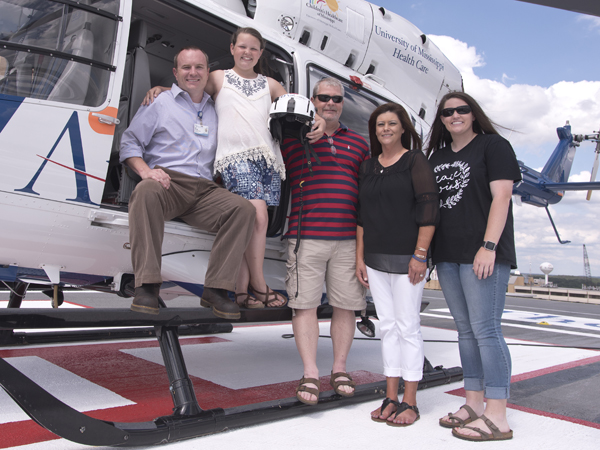
Abby is pictured with the critical care paramedic on her flight, Sam Marshall (left) and her family members: dad Ken, mom Melinda and sister Bailey.
AirCare, the University of Mississippi Medical Center's medical helicopter transport, also quickly arrived at the hospital. The night was foggy as AirCare critical-care paramedics Sam Marshall and Michael Mims secured Abby in a stretcher and her mom in the seat next to pilot Ron Ries. In 40 minutes, they landed at UMMC.
“You don't know what a relief it is to me to get up every morning and know that they can fly in bad weather,” Williams said. “Sam was my angel. He was my saving grace.”
It's just one example of north Mississippi's need for access to the state's most advanced medical flight service. UMMC on May 19 celebrated the expansion of its AirCare fleet from two to three helicopters, stationing an additional aircraft at Golden Triangle Regional Airport in Columbus. Bases also are located at UMMC's main campus and in Meridian.
“The unveiling of AirCare 3 is an important step forward for emergency response in Mississippi as we bring our unique capabilities to the Golden Triangle,” said Kevin Cook, chief executive officer of University Hospitals and Health System.
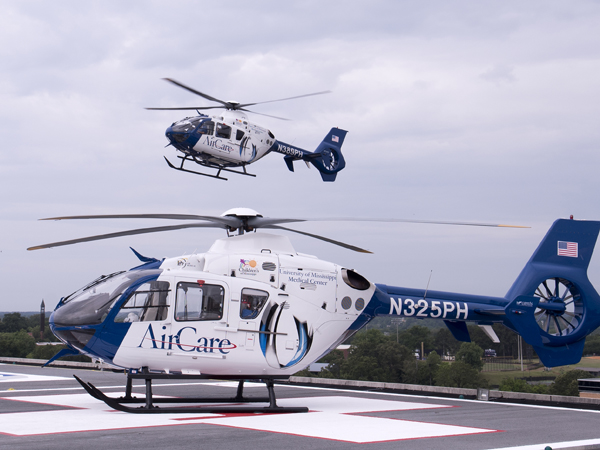
AirCare 3 sits on the helipad atop UMMC's Conerly Critical Care Hospital as AirCare 2 departs.
AirCare transports patients to the care they need, including Mississippi's only Level 1 trauma center located at UMMC in Jackson, and also brings critical care to the scene, where seconds can sometimes be the difference between life and death.
“Our AirCare helicopters service the entire state of Mississippi,” said Jonathan Wilson, the Medical Center's chief administrative officer. “We are proud to have AirCare 3 partnering with the first responders, ambulance providers and hospitals in northern Mississippi. Being based at the Golden Triangle Regional Airport provides us with advanced aviation services that allow our helicopters to safely fly in marginal weather when other helicopters are grounded.”
AirCare 3 began operating April 1 in a leased hangar at Airbus Helicopters, located behind the Columbus airport. Airbus is the manufacturer of AirCare 3 and the other two helicopters in the fleet. They are twin-engine, state-of-the-art aircraft that include autopilot.
“The access and rapid launch helps us so much in taking care of the patient and getting them where they need to be in a timely manner,” said Chris Bourland, director of Baptist Memorial Hospital Golden Triangle's ambulance service. “This is a direct link for trauma patients who need to go to a higher level of care with neurological capabilities.”
AirCare 3, Bourland said, can offer patients higher-level emergency care such as chest tubes and blood that ground ambulance transport can't. “Having these resources very close at hand will help improve patient outcomes,” he said. “That's what we're here for: the patients.”
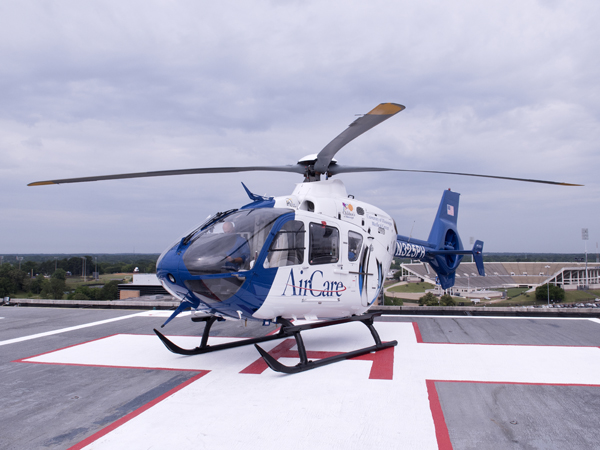
AirCare 3
“AirCare is more than just a mode of transportation,” Wilson said. “Rather than focusing on just a fast ride to the hospital, our focus is on providing the patients we care for the highest quality of emergency and critical care possible. We are able to bring the expertise of Mississippi's academic medical center to the patients faster to provide the most advanced care possible.”
As AirCare transported her dangerously ill child to UMMC, Williams said, “Sam was wonderful to keep me informed the whole time when he was in the back taking care of my baby.
“I couldn't see her, but Sam told me everything he was doing. When she seized again, he had to intubate her because she just wasn't breathing well.”
Marshall called her the next day to inquire about Abby. “He's been faithful in checking on us,” Williams said.
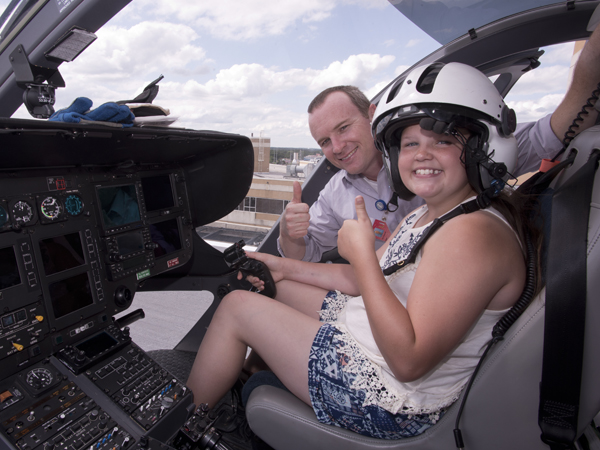
Marshall and Abby inside the cockpit of one of AirCare's three helicopters.
Today, Abby continues to see her pediatric specialists at UMMC. “She loves softball. She's doing well in school, and her teachers have been wonderful,” Williams said of her East Webster Elementary fifth-grader. “She's handled all of this better than any of us did. She's never questioned why, and that has helped us a lot.”
“I don't remember a thing,” Abby said of her transport in AirCare. Marshall took care of that recently when he gave her a personal AirCare tour at the Medical Center.
“I thought it was very neat, especially just how big it is,” said Abby, who plays softball for the Hotshotz traveling team and likes to play with her feist dogs Sadie and Izzy and her Australian shepherd Oakley.
The addition of AirCare 3 hits home for Marshall, who also serves as manager of emergency transport for both the Golden Triangle and Meridian bases. “This will make a huge impact,” he said. “Our focus is bringing the care to the patient. That's a different model than most programs.
“Being a lifelong resident of north Mississippi, it's very important to me that we have this type service available,” Marshall said. “We're working together with local providers to make a difference in patient care.”


